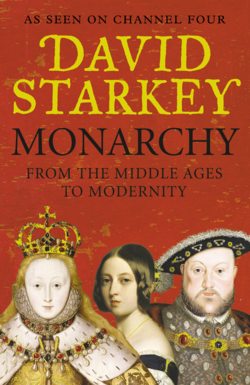Читать книгу Monarchy: From the Middle Ages to Modernity - David Starkey - Страница 15
KING AND EMPEROR
ОглавлениеHENRY VIII
On 24 June 1509, Henry VIII was crowned in front of the high altar at Westminster Abbey. The supreme symbol of the Tudor monarchy, the Crown Imperial, was now his.
But despite the myths and hopes embodied in the crown that sat on the seventeen-year-old boy’s head, it was a debased inheritance. All Henry VII’s dreams of an imperial English monarchy that ruled Scotland, Ireland and France and was a dominant power in Europe had ended in frustration. The old king, in his last inglorious years, was regarded as a miser and a tyrant hardly worthy of the crown he had designed. Instead, Henry VII ruled his ‘empire’ like a private landlord – strictly and with a beady eye on his rent. For those who knew anything of history, this was not how the ruler of a great nation was supposed to behave.
The son agreed, and his subjects knew it. His personality – sunny, gregarious and romantic – was the opposite of his father’s, and it promised a fresh start – although no one could have guessed how radical, even revolutionary, it would prove to be. Naturally, the young king was greeted with an outburst of joy after so many years of repugnant rule. ‘Heaven and earth rejoice,’ wrote Lord Mountjoy; ‘everything is full of milk and honey and nectar … Avarice has fled the country, our king is not after gold, or gems, or precious metals, but virtue, glory, immortality.’
He was right and Henry’s reign turned into a quest for fame as obsessive as that of any modern celebrity. It took many different forms. At first, Henry would try to breathe new life into the old monarchy. But it would essentially be a last gasp of traditional medieval kingship. Thereafter, the search for glory would eventually lead Henry into territory where no English king had ever dared to venture before. But it came at a price. Above all, it threatened to upset the traditional balance between freedom and authority and to turn English kingship into an untrammelled despotism that claimed power over men’s souls as well as their bodies.
